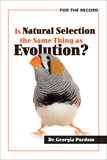
Does Ken Ham Embrace Evolution?
Responding to Professor Keathley’s Erroneous Claims
Kenneth Keathley is a professor of theology at Southeastern Baptist Theological Seminary, and an old-earth creationist who has been challenging young-earth creation for as long as I have known him. I appreciate the interactions that I’ve had with Professor Keathley in the past, and he comes across as a winsome and kind brother in Christ. Unfortunately, his recent blog on AiG’s position on speciation does not meet the standard of professionalism, scholarship, and charitable behavior toward a fellow brother in Christ.
The title of his post summarizes his contention: “Ken Ham Embraces Evolution.” To be sure, Keathley distinguishes our view from universal common ancestry. But putting “Ken Ham Embraces Evolution” as the title of his post is highly misleading. We are not evolutionists, never have embraced evolution, and have clearly articulated our views on speciation for decades.
Keathley tries to support his claim with some definitions. He claims that “micro-evolution is the variety and change that occurs within species” while “macro-evolution is the idea that species evolve into other species.” Hence, he charges that “young-earth creationists have traditionally accepted micro-evolution while rejecting macro-evolution. So it’s big news that Answers in Genesis has embraced macro-evolution.”
He may feel free to define terms however he wishes, but his scholarship on the young-earth creationist view is very deficient.
He may feel free to define terms however he wishes, but his scholarship on the young-earth creationist view is very deficient. For example, the publication of The Genesis Flood by John Whitcomb and Henry Morris in 1961 is viewed by historians as the catalyst for the modern creation movement. In this book, Whitcomb and Morris were already discussing the idea of speciation within created “kinds”: “It is unwarranted to insist that all the present species, not to mention all the varieties and subvarieties of animals in the world today, were represented in the Ark”1 (emphasis added). Whitcomb and Morris also reproduced a diagram from Frank Marsh whose depiction of species diversification underscored Whitcomb and Morris’s conclusions that speciation occurs within kinds, but one kind does not evolve into a completely different kind. Marsh’s work was published in 1947.
Today, the views of young-earth scientists like those at Answers in Genesis are largely the same. We embrace the formation of new species from the kinds that were on board the Ark while rejecting the transformation of one kind into another kind. Hence, for Keathley to claim that young-earth creationists have “shifted significantly from the positions argued by early young-earth creationists such as Henry Morris and Duane Gish” is factually incorrect. Leading young-earth creationists have been embracing speciation within kinds for at least 69 years.
While we all are in the process of sanctification and make factual errors, Keathley’s claim goes beyond simple mistakes. The other problem with Keathley’s claim is its implicit tarnishing of young-earth creation’s name, and in such a public way, with the godless and unbiblical idea of Darwinian evolution. To title a post “Ken Ham Embraces Evolution” definitely gets people’s attention—that’s his marketing strategy. But then to follow up this headline with a factually incorrect association on a very emotive, contentious, and deeply significant spiritual and moral question is, in my view, crossing a line of charitable Christian exchange.
Why would Professor Keathley do this? In the comments section below his article, he says, “The main problems I have with the AIG thesis are 1) the timeline they propose (of merely 200-500 years) [Keathley is referring to one aspect of the young-earth timeline for speciation], and 2) the confusion created in the pew when they don’t clearly acknowledge that they accept the notion of one species ‘evolving’ into another.” With respect to the latter objection, it should be clear that Keathley is adding to the confusion—not relieving it—by his poor scholarship on young-earth creation.
With respect to the fast production of species in a short amount of time, I have written a ~30,000 word technical paper that has just been accepted for publication in the . I will be happy to send it to Keathley once it appears online in PDF form, and I would be grateful for the opportunity to interact with him further on this important, challenging, but solvable “problem” that he sees with the young-earth creation view of species’ change.
At AiG, we are sensitive to the fact that, in light of the real history recorded in Genesis 3, all of us are imperfect, flawed bearers of the image of God who make mistakes from time to time. Keathley would not claim, of course, to be perfect in all his practice, and neither would anyone on AiG’s staff. However, as brothers in Christ, we all strive to embrace the truth, and we hope that Keathley will correct his mistakes and engage the actual positions that young-earth creationists have held for years.
Footnotes
- John C. Whitcomb and Henry M. Morris, The Genesis Flood. (Philllipsburg, NJ: Presbyterian and Reformed Publishing Company, 1961), 67.
Recommended Resources

Answers in Genesis is an apologetics ministry, dedicated to helping Christians defend their faith and proclaim the good news of Jesus Christ.
- Customer Service 800.778.3390
- Available Monday–Friday | 9 AM–5 PM ET
- © 2026 Answers in Genesis




